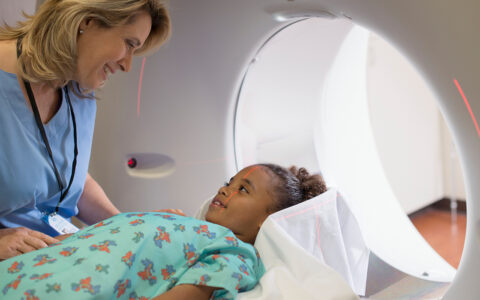A recent study at Monroe Carell Jr. Children’s Hospital at Vanderbilt found ketamine may reduce intracranial pressure (ICP) in children following traumatic brain injury (TBI) – challenging longstanding traditional thinking.
The anesthetic is often avoided in TBI because of a fear it might increase pressure instead, said Michael Wolf, M.D., director of neurocritical care for the Division of Critical Care Medicine. While evidence is mounting that ketamine may alleviate ICP in adults, but there has been little research supporting its use in children.
“We found that not only does ketamine not raise ICP in kids, in some cases it may even lower it,” Wolf said.
Wolf served as senior author on the study, which was selected as a featured article in Critical Care Medicine. Pediatric critical care fellow Jennifer Laws, M.D., served as first author, with support from a neurosurgery team that included Christopher Bonfield, M.D., Haley Vance, D.N.P., and John (Jay) Wellons, M.D.
Looking at Data
In the new retrospective study, Vanderbilt researchers explored the effects of ketamine on ICP in 33 children ages 1 month to 16 years.
All of the children were admitted to the pediatric intensive care unit with severe TBI. Twenty-two received a bolus of ketamine, with a total of 127 ketamine doses included in the analysis.
Ketamine was administered either for sedation or as an off-label treatment to combat rising ICP that can occur following TBI. Ketamine boluses were used emergently when the pressure rose above 20 mm Hg for more than five minutes.
The researchers analyzed both intracranial and cerebral perfusion pressures collected from the patients, writing: “In this retrospective, exploratory study, ICP did not increase following ketamine administration. In the setting of a guidelines-based protocol, ketamine was associated with a reduction in ICP during ICP crises.”
Notably, cerebral perfusion pressures tended to rise after ketamine doses that were given when ICP was high.
“This might be because, unlike other sedatives, ketamine does not usually lower blood pressure,” Wolf said. “We hope this means that ketamine offers effective sedation and pain control while supporting – rather than hindering – blood flow to the brain.”
Insidious Dangers of ICP
Researchers have been searching for ways to manage ICP, given its prevalence in a variety of brain conditions and injuries. Adults and children can experience ICP spikes due to hematomas and other intracranial masses, stroke, problems with cerebral spinal-fluid reabsorption, or even tetracycline use.
Elevated ICP can also compound damage caused by a brain injury, Wolf said.
“Children with severe TBI are at risk of dying or having long-term neurologic impairment, such as difficulty walking and talking. In the crucial days following their initial injury, our focus in the PICU is to minimize ongoing damage to their brains, primarily by preventing and treating high ICP.”
Left unchecked in children, ICP can hamper neurodevelopment. It can also lead to brain herniation or death in all ages, lingering as a persistent challenge for intensive care teams.
Limited Treatment Options
Even with these risks, ICP can be difficult to detect in the earliest stages. Advances such as pupillometry may help care teams act more quickly to prevent lasting damage, though treatment options are few.
“Despite decades of research, our treatment options remain limited to a handful of medicines and techniques,” Wolf said. Techniques run the gamut from simple head elevation to brain catheters that support cerebral spinal fluid drainage.
“This study might help open the door to a new use of an old drug.”
Past studies that showed a transient increase in ICP following ketamine use may have hampered the drug’s utility for decades. The latest study adds to a growing body of evidence disputing that finding, providing further rationale for ketamine’s use in ICP.
“This study might help open the door to a new use of an old drug that could help us continue to improve our approach to caring for these vulnerable patients,” Wolf said.
Research Springboard
While it was retrospective and exploratory, the study lays important groundwork, Wolf said. He is hopeful it will encourage other critical care teams to reevaluate the use of ketamine to manage ICP.
In the meantime, he is already working to expand the findings.
“Going forward, we plan to study the effects of ketamine in larger numbers of children with TBI, partnering with colleagues at other children’s hospitals to do so,” Wolf said. “If we are able to improve our understanding of ketamine’s effects in a larger study, we might find that ketamine represents another tool to provide the best possible treatment for children with TBI.”






